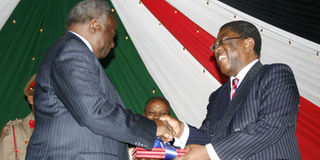Rival teams gear up for change

Attorney General Amos Wako presents the published draft constitution to President Kibaki at the KICC on May 6, 2010. Photo/FREDRICK ONYANGO
The draft constitution was published on Thursday with passionate appeals to Kenyans to successfully end a two-decade old clamour for change.
The document, which makes a raft of radical changes in the way the country will be governed, was published by Attorney-General Amos Wako. Now Kenyans can pass their verdict on it in the next 90 days at a referendum.
Speaking at the colourful ceremony at Nairobi’s Kenyatta International Conference Centre, Mr Wako recounted the ups and downs that the struggle for new laws has experienced.
“It has been bumps, twists and turns. Blood has been shed, lives lost, injuries incurred, tears flowed and sacrifices made to reach where we are. Like the children of Israel who wandered in the wilderness for long, we are about to cross River Jordan in the promised land,” he said.
President Kibaki, acknowledged that not all Kenyans were happy with the document, but nevertheless urged the public to vote Yes and amend it later.
“This is the best you can have after 20 years. It is imperative to conclude this and focus our energies on nation building. We have to move forward as a nation,” he said.
Prime Minister Raila Odinga dismissed calls to amend the draft before the referendum, saying the votes at the ballot box will determine the outcome. “This is a defining moment. The hour has come. The time is now,” he said.
Vice-President Kalonzo Musyoka, who has been under public scrutiny over his stand on the draft, reiterated that he will vote Yes but said the proposed Constitution should not divide the country.
Close the door
“We should not allow this document to polarise the country. We cannot close the door to amendments because it is not static; it is not cast in stone. My vote is a big Yes,” he said.
Mr Wako gave copies of the draft to the three leaders and National Assembly Speaker Kenneth Marende. Parliamentary Select Committee on the review process chairman Abdikadir Mohamed, Committee of Experts boss Nzamba Kitonga and Interim Independent Electoral Commission chairman Ahmed Isaack Hassan were also given their copies.
Mainstream church leaders — the Catholics, Anglicans, Presbyterians and the evangelicals — kept away from the function that was attended by ministers, MPs and diplomats. However, Anglican Bishop Timothy Ranji offered prayers.
Most MPs in the No campaign team, among them Higher Education minister William Ruto, skipped the event. The IIEC effectively took over the baton for the next phase, which will involve preparing the public for the referendum that has to take place within 90 days.
Mr Hassan’s team is required to frame the referendum question within seven days and have the voters’ registers ready in 21 days. The CoE will also have 30 days to conduct civic education and politicians will only be allowed to campaign afterwards.
If Kenyans endorse the proposed Constitution at the referendum, President Kibaki will have 14 days to promulgate it. The document promises a lean Cabinet of no more than 22 members, State provided basic needs and billions of shillings to the grassroots.
The proposed new set of laws, which are a product of two decades of clamour, does away with the Prime Minister’s position, renames the Vice-President a Deputy President and fixes the number of ministers — to be called Cabinet Secretaries — to between 14 and 22.
The Cabinet Secretaries will not be MPs, but professionals picked by the President from other sectors of the economy and approved by Parliament just like in the United States. The posts of assistant ministers has been abolished.
The draft creates an all-powerful President, but at the same time gives Parliament, Senate and the Judiciary the independence and powers they require to block the Executive from abusing the enormous authority.
In a bold move to improve the fortunes of the vulnerable in society, the proposed Constitution requires that the government provides the poor with food, clean water, adequate housing and access to health services.




